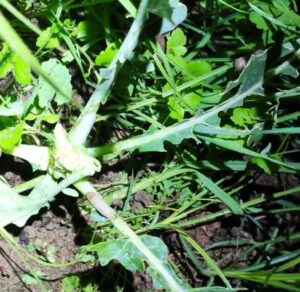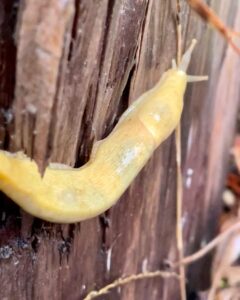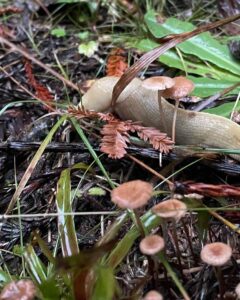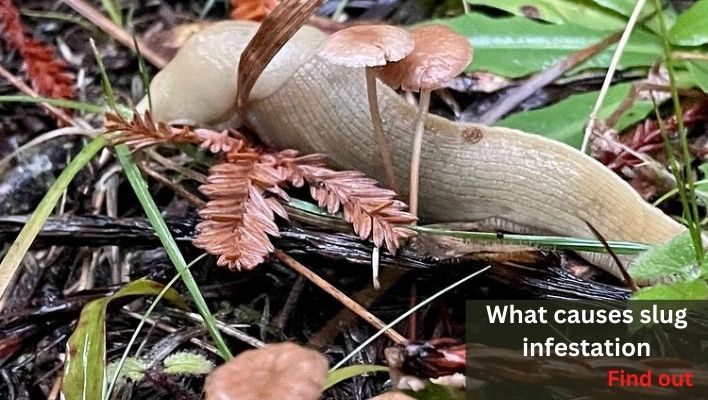Slug infestation happens when you have a lot of slugs around your place. If you notice this, you may not be able to feel at ease knowing that your environment is not protected anymore. Slugs can cause a lot of damage to your plants and make your patio look irritating with their slime.
They can cause damage to plants. This will leave you with no other choice than killing or deterring them before they multiply further and wreak havoc on your garden.
Even though some plants are vulnerable to slug infestation, whereas some are not, it is still important to manage slug population using other methods, or through plants they hate.
The slug infestation is a big problem for many gardeners. The reason for this is that the slugs population can grow and multiply quickly because of the moist environment in which they live and the availability of food.
As any gardener can attest, slug infestation can be a real pain in the butt. If you’re looking for ways to control slug populations and prevent them from wreaking havoc on your garden, continue reading.
You’ll learn about the causes of slug infestation, some preventative measures, and how to successfully use common household products to control these pests in all outdoor habitats.
Why slugs infest your gardens
Slugs like moist soil with lots of cool shade and a little bit of sunlight. They also love old leaves from plants that have died back during wintertime; anywhere there’s leaf litter around your garden will probably be crawling with slugs.
Slugs will infest your garden, looking for food and shelter, or find it convenient with little to no predators. When your garden provides the right atmosphere for them to thrive, such as a shady, moist environment, you will find these slugs in your garden.

Continuous high levels of moisture will also encourage slugs to move into your garden. This can happen if you water from overhead or an automatic sprinkler system that doesn’t let water drain away from the area where you want it applied (so there’s no drainage).
Another reason slugs will thrive in your garden is the absence of predators or parasites in the area where they live.
Overfertilizing your garden with nutrients like nitrogen or phosphorus is another reason you find slugs in your garden. These nutrients are key for growing plants, but too much can lead to an overabundance of these nutrients in the soil and make it more attractive to slugs than other species that would otherwise eat them away.
Causes of slug infestation
The most common cause of slug infestation is your garden’s high moisture and food availability. Slugs eat just about anything and will go after plants and weeds. If you’ve got a garden with many plants infested with slugs, it is important to consider slug control methods as fast as possible.
Slugs can also enter your home through cracks in siding or windowsills, or they may find their way into your yard through drainage pipes or other openings.
If you’re experiencing slug infestation, it’s important to know what’s causing it so you can take steps to get rid of it.
Over-irrigation
Over-irrigation is a common cause of slug infestation. This occurs when you water too much and don’t allow the plant to dry out.
A common cause of over-irrigation is drip irrigation systems, which are great for watering plants in the summer and fall. However, when faulty can lead to several problems for your plants, including:
- The plants are waterlogged, which means they’re holding onto more water than they should be. This can cause root rot and other issues.
- The plants are dehydrated, which can cause them to die from disease or lack of water in their systems.
- The plants are unable to absorb nutrients properly because there’s too much water in the soil.
The solution? Ensure you’re only watering your plants when the soil is dry at least half an inch below their leaves. This will ensure that you don’t over-irrigate them and create harmful conditions for your plants’ root systems.
Rainy weather
If you’ve noticed a slug infestation in your garden, it’s probably because it’s been raining. This is because rainwater is a great breeding ground for slugs. Rainwater also causes slug eggs to hatch faster, which means more slugs are born in the same period.
Slugs are loved to eat and love a nice, wet place to live. So when it rains, they go out looking for food. They’re attracted to everything, including plants and petunias, usually planted in flower beds and gardens.

Plants they love
There are many factors that lead to the growth of slugs. One of the most common causes is a plentiful food source. Slugs are attracted to ripe fruit, decaying vegetation, and numerous herbs and plants, so it’s not surprising that they are often found near areas with a lot of vegetation or composting materials.
Slugs are omnivores, so they can eat a wide variety of plants. They’re primarily carnivorous, though, and will eat just about anything they can get their mouths around.
A warm, moist climate
Most times, slug infestation of your garden is caused by a warm, moist climate. If you’re growing plants in a heated greenhouse or your own house, the humidity is higher than outside. This means there are more slugs around, and they’re more likely to find their way indoors.
A warm, moist climate can be a perfect breeding ground for slugs. In addition to the temperature, moisture and a lack of air circulation are also factors that contribute to slug infestations.
Compost heaps or other rotting vegetation
A slug infestation is often the result of a compost heap or other rotting vegetation. This can be caused by slugs feeding on the decomposing matter in a heap or by slugs living inside the heap, which they can use as shelter and food sources.
Slug eggs can survive for years in these environments, and when they hatch, they grow quickly. The larvae feed on living plants and can destroy them if they’re not contained.
In addition to compost heaps, slugs like to live in damp soil near water sources or lakes. They also like to eat good-quality organic matter like leaves, mulch, and fruit trees. If you have an overgrown lawn and regular rainfall, you’re likely to have a slug problem.
If you find slugs in your compost heap, it’s best to remove them before they damage the composting process or eat your plants! You can do this by using organic methods such as freezing or salting.
Plant seedlings
Slug infestation is a common problem that can affect your plants. Planted seedlings are especially vulnerable to slug infestation because they are very young and have not yet developed strong defenses against pests.
Plants can experience slug damage in two ways: slow-moving slugs crawl over leaf surfaces and feed by chewing onto the leaf; fast-moving slugs can burrow into plants and damage them by feeding through holes they create within leaves.
Both types of slugs are capable of causing serious damage to your plants; however, slow-moving slugs tend to cause more damage than fast-moving ones because they are more likely to eat through leaves with their mouths before moving on to another one.

How to stop slug infestation
You know how annoying and destructive it can be if you have a slug infestation in your garden. Not only do they love to eat plants, but they also carry disease and leave behind slime trails as they move across your lawn or porch.
Getting rid of them from your garden or finding a method to stop them from eating your plants is important. There are a few ways to prevent slug infestation in your garden: Here’s a quick and easy way to get rid of slugs in your home:
- Keep your garden slug-free using coffee grounds.
- Keep your compost heaps clean, so they don’t attract unwanted visitors (like slugs).
- Use slug traps: these traps will lure slugs into them so they can be disposed of properly. There are many traps, and beer traps are one of the most effective.
- Use Pallets: You can also use slug pellets on your plants and garden. These pellets contain a pesticide that will kill slugs when they come into contact with it. You should place these pellets around the base of plants, where they are most likely to be found. You should also reapply them after rain or when the ground has been disturbed by digging or hoeing.
- Get rid of the food source: If there’s one thing that slugs love more than plants, it’s food. They’ll eat anything you leave out. So remove anything that could attract slugs around your house and yard (like rotting fruit). You can also remove old leaves or materials collected in your yard and lawn.
- Bark Mulch: Bark mulch is also a great way to keep your plants healthy and happy, especially when dealing with a slug infestation. Bark mulch helps keep the roots of your plants protected from pests, which means that they can thrive and grow without being bothered by any pests.
- Use slug-repellent plants: One of the most effective and cost-effective methods is to use slug-repellent plants. These plants have smells that repel slugs or other pests. These plants will help keep slugs away from your garden, so you don’t have to spend money on chemicals or products designed for this purpose.
- Sprinkle salt on them if you have pets: Sprinkling salt on top of the soil prevents them from climbing up into the plants and eating them. Salt is especially useful for preventing slugs in grassy areas, as it stays on top of the soil rather than sinking into it. Salt will kill the slug only if it gets into its skin or mouth.
- Scatter eggshells in the garden to keep them away: Slugs cannot crawl over the shells of eggs as they can cut through their body which could cause their death.
- Create a slug barrier with copper strips: Slug barriers can be created with copper strips, which are a natural deterrent to slugs. Copper is a highly effective slug repellant, and the copper will continue to repel slugs for as long as you leave it in place.
There are numerous other methods to prevent slugs from infesting your plants; these are natural methods to keep your plants healthy and garden slug free.
Are slugs in the house dangerous?
Slugs are not necessarily dangerous, though they pose a risk to pet and child safety, as they carry pathogens that could harm humans and other animals; they’re not typically known for causing serious diseases like salmonella or tularemia.
If they find their way into your home, they won’t hurt you unless you handle them inappropriately, like touching them with bare hands or putting them in your mouth without washing them.
In most cases, slugs merely seek shelter when they enter your home and will leave on their own once their needs have been met.
However, slugs pose a health risk to plants and crops in your garden, so it’s best to remove them from your yard before they can do damage.
If you have slugs in your home, you should use a safe form of slug control so that they don’t cause any damage or harm to people or pets who come into contact with them. If you cannot get rid of them, call an exterminator who can help identify where those little creatures are hiding out and take care of the situation quickly.
